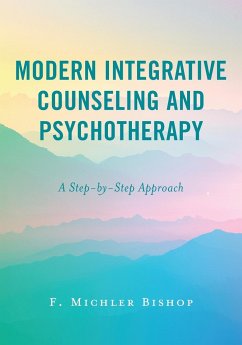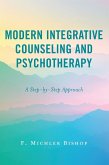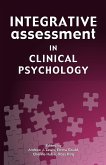- Broschiertes Buch
- Merkliste
- Auf die Merkliste
- Bewerten Bewerten
- Teilen
- Produkt teilen
- Produkterinnerung
- Produkterinnerung
This practical, affordable guide for integrating multiple clinical approaches into mental health treatment plans shows therapists how to structure sessions and evidence-based techniques to benefit individual clients, including within the constraints of short-term modalities.
Andere Kunden interessierten sich auch für
![Modern Integrative Counseling and Psychotherapy Modern Integrative Counseling and Psychotherapy]() F. Michler BishopModern Integrative Counseling and Psychotherapy133,99 €
F. Michler BishopModern Integrative Counseling and Psychotherapy133,99 €![Integrative Assessment in Clinical Psychology Integrative Assessment in Clinical Psychology]() Integrative Assessment in Clinical Psychology55,99 €
Integrative Assessment in Clinical Psychology55,99 €![Integrative Counselling and Psychotherapy Integrative Counselling and Psychotherapy]() Basia SpalekIntegrative Counselling and Psychotherapy186,99 €
Basia SpalekIntegrative Counselling and Psychotherapy186,99 €![Constructivist, Critical, And Integrative Approaches To Couples Counseling Constructivist, Critical, And Integrative Approaches To Couples Counseling]() Constructivist, Critical, And Integrative Approaches To Couples Counseling78,99 €
Constructivist, Critical, And Integrative Approaches To Couples Counseling78,99 €![Handbook of Integrative Developmental Science Handbook of Integrative Developmental Science]() Handbook of Integrative Developmental Science348,99 €
Handbook of Integrative Developmental Science348,99 €![The Integrative Family Therapy Supervisor The Integrative Family Therapy Supervisor]() Robert E. LeeThe Integrative Family Therapy Supervisor65,99 €
Robert E. LeeThe Integrative Family Therapy Supervisor65,99 €![Integrative Therapy Integrative Therapy]() Maja O'BrienIntegrative Therapy167,99 €
Maja O'BrienIntegrative Therapy167,99 €-
-
-
This practical, affordable guide for integrating multiple clinical approaches into mental health treatment plans shows therapists how to structure sessions and evidence-based techniques to benefit individual clients, including within the constraints of short-term modalities.
Hinweis: Dieser Artikel kann nur an eine deutsche Lieferadresse ausgeliefert werden.
Hinweis: Dieser Artikel kann nur an eine deutsche Lieferadresse ausgeliefert werden.
Produktdetails
- Produktdetails
- Verlag: Rowman & Littlefield Publishers
- Seitenzahl: 224
- Erscheinungstermin: 15. Februar 2024
- Englisch
- Abmessung: 254mm x 178mm x 12mm
- Gewicht: 431g
- ISBN-13: 9781538175606
- ISBN-10: 1538175606
- Artikelnr.: 68537456
- Herstellerkennzeichnung
- Libri GmbH
- Europaallee 1
- 36244 Bad Hersfeld
- gpsr@libri.de
- Verlag: Rowman & Littlefield Publishers
- Seitenzahl: 224
- Erscheinungstermin: 15. Februar 2024
- Englisch
- Abmessung: 254mm x 178mm x 12mm
- Gewicht: 431g
- ISBN-13: 9781538175606
- ISBN-10: 1538175606
- Artikelnr.: 68537456
- Herstellerkennzeichnung
- Libri GmbH
- Europaallee 1
- 36244 Bad Hersfeld
- gpsr@libri.de
F. Michler Bishop, PhD, is the director of Alcohol and Substance Abuse Services and a senior staff psychologist at the Albert Ellis Institute (AEI) where he worked closely with Dr. Albert Ellis for over twenty years, running groups and workshops. He is the author of Am I Addicted? 64 Questions and Answers to Help You Change an Addictive or Semi-Addictive Behavior and Managing Addictions: Cognitive, Emotive and Behavioral Techniques, as well as many research articles and, most recently, blogs for Psychology Today. Dr. Bishop advocates for a compassionate, integrative, goal-focused modern therapeutic approach, incorporating a variety of research-based treatment options. As national vice president of SMART Recovery®, he was instrumental in the development of SMART Recovery's Four-Point Program. He has conducted numerous workshops on CBT, Rational Emotive Behavior Therapy (REBT), MI, and SMART Recovery in the United States and internationally. He has worked at AEI for over thirty years, seeing clients with a wide variety of problems, including anxiety and mood disorders, and impulse control and relationships issues.
Introduction
Part I: Modern Counseling and Psychotherapy
Chapter 1: Moving Beyond Schools of Counseling and Psychotherapy
Chapter 2: Guiding Principles for Modern Integrated Counseling and
Psychotherapy
Part II: Initial In-Session and Between-Session Work: Step-by-Step
Chapter 3: Step 1: Build the Working Relationship: Enhancing Hope and
Motivation
Chapter 4: Step 2: Initial Assessment
Chapter 5: Step 3: Agreeing on the Therapeutic Goals
Chapter 6: Step 4: Set the Agenda
Chapter 7: Step 5: In-Session Work
Chapter 8: Step 6: Agree on Between-Session Work
Chapter 9" Working with Diverse Clients
Part III: Subsequent Sessions
Chapter 10: On-going Assessment, Evaluating Between-Session Work, Checking
on Therapeutic
Chapter 11: Facilitating Acceptance, Compassion and Change: Mindfulness,
Metastability and Existential/Humanist Issues
Chapter 12: Facilitating Acceptance, Compassion and Change: Emotion-focused
and Imagery-Focused Work
Chapter 13: Facilitating Acceptance, Compassion and Change: Genetics,
Neurochemistry and Neuroplasticity
Chapter 14: Moving Forward, Sliding Back: Managing Change and Metastability
Chapter 15: If Needed, Dig Deeper: Past-focused Work, Trauma and Childhood
Issues
Chapter 16: Subsequent Between-session Exercises
Part IV: Other Issues
Chapter 17: Self /Selves, Identity/Identities and Change
Chapter 18: Integrating Coaching
Chapter 19: Medications: Are They Right for Your Client?
Chapter 20: Build Your Practice, Protect Yourself and Prevent Burnout
References
Index
About the Author
Part I: Modern Counseling and Psychotherapy
Chapter 1: Moving Beyond Schools of Counseling and Psychotherapy
Chapter 2: Guiding Principles for Modern Integrated Counseling and
Psychotherapy
Part II: Initial In-Session and Between-Session Work: Step-by-Step
Chapter 3: Step 1: Build the Working Relationship: Enhancing Hope and
Motivation
Chapter 4: Step 2: Initial Assessment
Chapter 5: Step 3: Agreeing on the Therapeutic Goals
Chapter 6: Step 4: Set the Agenda
Chapter 7: Step 5: In-Session Work
Chapter 8: Step 6: Agree on Between-Session Work
Chapter 9" Working with Diverse Clients
Part III: Subsequent Sessions
Chapter 10: On-going Assessment, Evaluating Between-Session Work, Checking
on Therapeutic
Chapter 11: Facilitating Acceptance, Compassion and Change: Mindfulness,
Metastability and Existential/Humanist Issues
Chapter 12: Facilitating Acceptance, Compassion and Change: Emotion-focused
and Imagery-Focused Work
Chapter 13: Facilitating Acceptance, Compassion and Change: Genetics,
Neurochemistry and Neuroplasticity
Chapter 14: Moving Forward, Sliding Back: Managing Change and Metastability
Chapter 15: If Needed, Dig Deeper: Past-focused Work, Trauma and Childhood
Issues
Chapter 16: Subsequent Between-session Exercises
Part IV: Other Issues
Chapter 17: Self /Selves, Identity/Identities and Change
Chapter 18: Integrating Coaching
Chapter 19: Medications: Are They Right for Your Client?
Chapter 20: Build Your Practice, Protect Yourself and Prevent Burnout
References
Index
About the Author
Introduction
Part I: Modern Counseling and Psychotherapy
Chapter 1: Moving Beyond Schools of Counseling and Psychotherapy
Chapter 2: Guiding Principles for Modern Integrated Counseling and
Psychotherapy
Part II: Initial In-Session and Between-Session Work: Step-by-Step
Chapter 3: Step 1: Build the Working Relationship: Enhancing Hope and
Motivation
Chapter 4: Step 2: Initial Assessment
Chapter 5: Step 3: Agreeing on the Therapeutic Goals
Chapter 6: Step 4: Set the Agenda
Chapter 7: Step 5: In-Session Work
Chapter 8: Step 6: Agree on Between-Session Work
Chapter 9" Working with Diverse Clients
Part III: Subsequent Sessions
Chapter 10: On-going Assessment, Evaluating Between-Session Work, Checking
on Therapeutic
Chapter 11: Facilitating Acceptance, Compassion and Change: Mindfulness,
Metastability and Existential/Humanist Issues
Chapter 12: Facilitating Acceptance, Compassion and Change: Emotion-focused
and Imagery-Focused Work
Chapter 13: Facilitating Acceptance, Compassion and Change: Genetics,
Neurochemistry and Neuroplasticity
Chapter 14: Moving Forward, Sliding Back: Managing Change and Metastability
Chapter 15: If Needed, Dig Deeper: Past-focused Work, Trauma and Childhood
Issues
Chapter 16: Subsequent Between-session Exercises
Part IV: Other Issues
Chapter 17: Self /Selves, Identity/Identities and Change
Chapter 18: Integrating Coaching
Chapter 19: Medications: Are They Right for Your Client?
Chapter 20: Build Your Practice, Protect Yourself and Prevent Burnout
References
Index
About the Author
Part I: Modern Counseling and Psychotherapy
Chapter 1: Moving Beyond Schools of Counseling and Psychotherapy
Chapter 2: Guiding Principles for Modern Integrated Counseling and
Psychotherapy
Part II: Initial In-Session and Between-Session Work: Step-by-Step
Chapter 3: Step 1: Build the Working Relationship: Enhancing Hope and
Motivation
Chapter 4: Step 2: Initial Assessment
Chapter 5: Step 3: Agreeing on the Therapeutic Goals
Chapter 6: Step 4: Set the Agenda
Chapter 7: Step 5: In-Session Work
Chapter 8: Step 6: Agree on Between-Session Work
Chapter 9" Working with Diverse Clients
Part III: Subsequent Sessions
Chapter 10: On-going Assessment, Evaluating Between-Session Work, Checking
on Therapeutic
Chapter 11: Facilitating Acceptance, Compassion and Change: Mindfulness,
Metastability and Existential/Humanist Issues
Chapter 12: Facilitating Acceptance, Compassion and Change: Emotion-focused
and Imagery-Focused Work
Chapter 13: Facilitating Acceptance, Compassion and Change: Genetics,
Neurochemistry and Neuroplasticity
Chapter 14: Moving Forward, Sliding Back: Managing Change and Metastability
Chapter 15: If Needed, Dig Deeper: Past-focused Work, Trauma and Childhood
Issues
Chapter 16: Subsequent Between-session Exercises
Part IV: Other Issues
Chapter 17: Self /Selves, Identity/Identities and Change
Chapter 18: Integrating Coaching
Chapter 19: Medications: Are They Right for Your Client?
Chapter 20: Build Your Practice, Protect Yourself and Prevent Burnout
References
Index
About the Author








